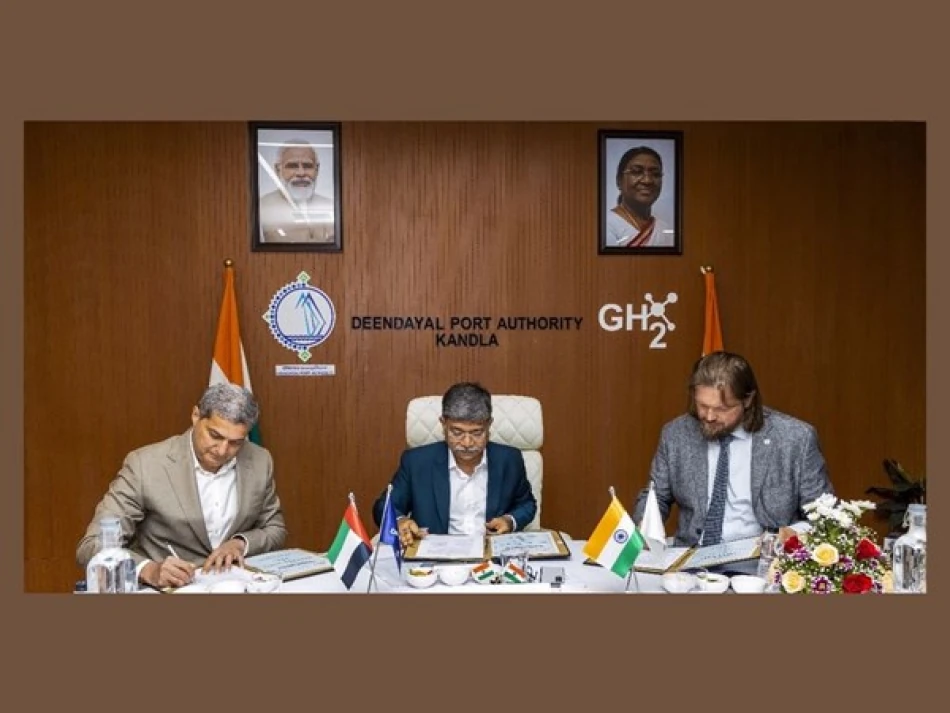
Dubai Ports Explores Autonomous Rail Freight Potential in India
Dubai's DP World Pilots Revolutionary Magnetic Rail Technology to Transform India's Port Operations
DP World, the Dubai-based global port operator, has partnered with India's Deendayal Port Authority and Netherlands-based Nevomo to test breakthrough magnetic rail technology that could revolutionize cargo movement across India's port network. The 750-meter pilot project represents the first autonomous freight transport system of its kind in India, potentially setting a new standard for sustainable logistics across emerging markets.
The Technology Behind the Partnership
The collaboration centers on Nevomo's "MagRail" technology, which uses linear motors to power autonomous electric vehicles on existing railway infrastructure. This system promises to dramatically increase the capacity, efficiency, and speed of both containerized and bulk cargo transport while reducing operational costs and carbon emissions.
The pilot project at Deendayal Port in Kandla, Gujarat, will serve as a real-world testing ground for autonomous cargo movement within an active port environment. If successful, the technology could be scaled across India's extensive port network, which handles over 1.3 billion tons of cargo annually.
Why This Matters for Global Trade
India's logistics sector represents roughly 14% of the country's GDP, significantly higher than developed economies where it typically accounts for 8-10%. This inefficiency costs the Indian economy billions annually and makes the country's exports less competitive globally. The MagRail technology directly addresses these challenges by creating faster, more reliable connections between ports and inland destinations.
Strategic Alignment with India's Infrastructure Vision
The partnership aligns perfectly with India's National Logistics Policy and the ambitious PM Gati Shakti initiative, a comprehensive multimodal connectivity plan aimed at modernizing the country's logistics infrastructure. Prime Minister Narendra Modi's government has committed over $1.4 trillion to infrastructure development over the next five years, with ports and railways receiving priority funding.
Deendayal Port, formerly known as Kandla Port, handles approximately 115 million tons of cargo annually and serves as a crucial gateway for India's western states. The port's willingness to test cutting-edge technology reflects India's broader push to digitize and modernize its trade infrastructure.
Market Implications and Competitive Positioning
For DP World, this partnership represents more than just technological innovation—it's a strategic move to maintain competitive advantage in an increasingly crowded global ports market. The company operates 78 marine and inland terminals across six continents and has been investing heavily in automation and smart logistics solutions.
The timing is particularly significant as global supply chains continue to recover from pandemic disruptions. Ports worldwide are under pressure to increase throughput while reducing environmental impact, making autonomous systems like MagRail increasingly attractive to operators and regulators alike.
Comparison with Global Trends
This initiative places India alongside other nations pioneering autonomous logistics systems. Singapore's PSA International has been testing autonomous vehicles at its terminals since 2018, while the Port of Rotterdam has deployed autonomous barges for container transport. However, India's project is unique in its focus on integrating autonomous systems with existing rail infrastructure, potentially offering a more cost-effective scaling model.
Environmental and Economic Impact
The environmental benefits could be substantial. Traditional diesel-powered cargo handling generates significant emissions, while electric autonomous systems promise near-zero operational carbon footprint. This aligns with India's commitment to achieve net-zero emissions by 2070 and could help the country meet its intermediate climate targets.
From an economic perspective, the technology could reduce cargo dwell time—the period containers spend at ports—by up to 30%, according to industry estimates. This improvement would have cascading effects throughout India's supply chain, potentially reducing costs for manufacturers and improving export competitiveness.
Challenges and Future Outlook
Despite the promising technology, significant challenges remain. India's complex regulatory environment, varying infrastructure standards, and the need for workforce retraining could slow implementation. Additionally, the technology must prove its reliability in India's challenging climate conditions, including monsoons and extreme heat.
However, the partnership's structure suggests strong commitment from all parties. DP World's involvement provides international expertise and capital, while Deendayal Port Authority offers regulatory support and operational knowledge. Nevomo brings proven technology that has already been tested in European conditions.
If successful, this pilot could catalyze broader adoption of autonomous logistics systems across India's 12 major ports and numerous smaller facilities. The technology could also be exported to other developing nations seeking to modernize their logistics infrastructure, potentially creating a new revenue stream for the partners involved.
The project represents a critical test of whether cutting-edge European technology can be successfully adapted to the unique challenges of Indian logistics, potentially setting a template for future infrastructure partnerships between developed and emerging economies.
Most Viewed News

 Layla Al Mansoori
Layla Al Mansoori






